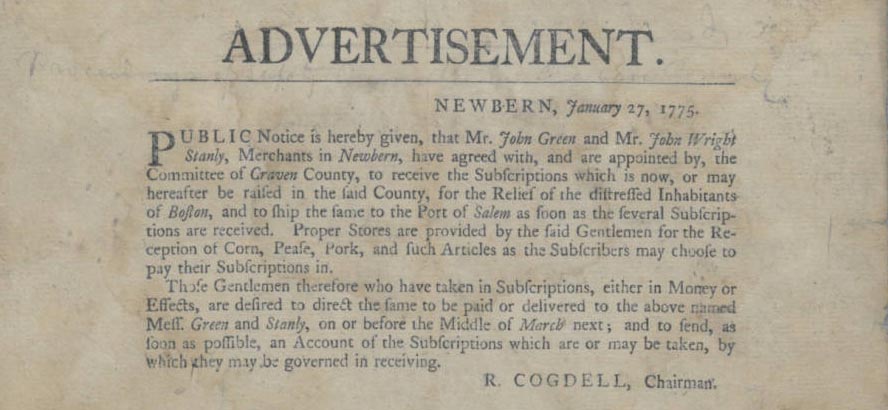
Revolutionary War Era
The American Revolutionary War (1775-1783) secured the independence of the United States of America from Great Britain and established a constitutional democracy.
Following the passage of the Intolerable Acts in June 1774, colonial legislatures selected delegates to meet in Philadelphia to consider the issues the American colonies had with Great Britain's Parliament. North Carolina's Whigs, who supported independence, formed a provincial congress and selected representatives to be sent to the Continental Congress in September 1774.
In April 1775, the Revolutionary War began with the skirmishes at Lexington and Concord, and North Carolina joined the war in May 1775, an event that drove Colonial Gov. Josiah Martin out of office and out of the country.
For additional records that document the Revolutionary War, consult the records of Martin and the first North Carolina State Governor, Richard Caswell (1776-1780, 1785-1787). These records are imaged and available here as part of the Governors Papers: Historical collection.
Revolutionary War Era
The American Revolutionary War (1775-1783) secured the independence of the United States of America from Great Britain and established a constitutional democracy.
Following the passage of the Intolerable Acts in June 1774, colonial legislatures selected delegates to meet in Philadelphia to consider the issues the American colonies had with Great Britain's Parliament. North Carolina's Whigs, who supported independence, formed a provincial congress and selected representatives to be sent to the Continental Congress in September 1774.
In April 1775, the Revolutionary War began with the skirmishes at Lexington and Concord, and North Carolina joined the war in May 1775, an event that drove Colonial Gov. Josiah Martin out of office and out of the country.
For additional records that document the Revolutionary War, consult the records of Martin and the first North Carolina State Governor, Richard Caswell (1776-1780, 1785-1787). These records are imaged and available here as part of the Governors Papers: Historical collection.
The Revolutionary War digital collection is comprised of selected documents from the government and private collections of the State Archives of North Carolina that highlight this important time in history. The State Agency materials include:
SR.12.11.4, Secretary of State, Miscellaneous County Records: Court Records, 1739-1789
- Court of Chancery Records, 1740-1789
- Magistrates and Freeholders Courts and Court Martial, 1740-1789
- Courts of Oyer and Terminer (County and District), 1773-1777
SR.12.13.3, Secretary of State, Records Relating to the American Revolution, 1774-1781
- Records of the Committees of Safety, 1774-1776
- Records of the Provincial Council of Safety, 1775-1776
- Records of the Provincial Conventions and Congresses, 1774-1776
- Records of the Continental Congress, 1774-1779
- Records of the Board of War, 1780-1781
SR.204.15, Treasurer's and Comptroller's Papers, 1776-1801
- Federal Conventions and Congresses: Pay and Expenses of Delegates Records, 1776-1801
This collection also includes a selection of materials from the State Archives Private Collections, including:
- PC.16, Tillie Bond Collection
- PC.29, Charles McDowell Papers
- PC.60, Joseph Graham Papers
- PC.61, William Alexander Graham Papers
- PC.176, John Williams Papers
- PC.242, Richard Caswell Papers
- PC.258, Gideon Lamb Papers
- PC.298, Farlin Q. Ball Collection
- PC.392, James Carr Papers
- PC.412, William Caswell Papers
- PC.414, Richard Cogdell Papers
- PC.612, Robert Howe Papers
- PC.710, Nicholas Long Papers
- PC.719, Archibald Maclaine Papers
- PC.752, Alexander Martin Papers
- PC.835, John Penn Papers
- PC.839, Thomas Person Papers
- PC.844, James Pickett Paper
- PC.919, John Simpson Papers
- PC.948, Samuel Spencer Papers
- PC.1141, William Hooper Papers
- PC.1178, Hugh McDonald Paper
This collection also includes a selection of materials from the State Archives Military Collections, including:
- AMREV, War of the Revolution Papers, 1776-1789
- Series 1: Board of War, 1780-1781
- Series 2: Commissary Correspondence, 1779-1783
- Series 3: British and Loyalist Papers, 1776-1783
- Series 4: Miscellaneous Papers, 1776-1789
The Regulator Movement was a brief uprising in eastern North Carolina from 1768 to 1771, before the start of the American Revolution.
North Carolinians became angry with government officials, particularly appointed officials, due to excessive taxes, dishonest sheriffs, and illegal fees. Western Carolinians were particularly upset as they were taxed at the same rate as the more productive land in the Coastal Plain. The newly built "Tryon's Palace" in New Bern, the governor's new home and state capitol, built at public expense, did not help.
When attempts at peaceful negotiations were unsuccessful, Regulators took up a more disruptive approach, targeting public officials and court proceedings. Royal Governor William Tryon in 1771 called up the militia, and General Hugh Waddell was ordered to march toward the Regulators in Hillsborough as a show of force. On May 16, 1771, the Battle of Alamance broke out after the Regulators refused to disband.
The Regulators were defeated at the Battle of Alamance and eventually disbanded. Governor Tryon offered pardons for those who pledged an oath of allegiance to the royal government.
